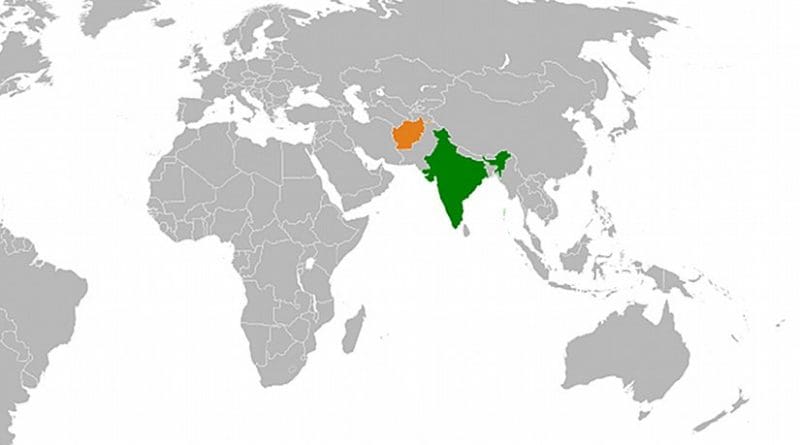India-Afghanistan Strategic Partnership And The Question Of Pakistan – Analysis
India and Afghanistan are now strategic partners and it is a welcome move but there are critical issues for consideration, before declaring it a diplomatic victory. This strategic partnership was envisaged in past but never brought on table contemplating the strong opposition of Pakistan.
The signing of strategic partnership divulges that present Kabul establishment is completely frustrated with Pakistan. Afghan government has strong reasons for this annoyance because Pakistan despite several repeated commitments, are unwilling to shred its ties with Taliban. The recent surge of terrorist activities in Afghanistan reveals the involvement of Pakistani secret agency- ISI, and this is purposely enthused to destabilize the Karzai government.
The brutal murder of peace apostle Prof. Rabbani, speaks volume about the intentions of Islamabad. Kabul has officially handed authentic evidences to Islamabad, corroborating ISI’s involvement in Prof. Rabbani’s killing. There are questions, as why Pakistan is not interested in the peace process, where it will get enough space to accommodate all its worries. Peace in Afghanistan is contingent on role of Pakistan and this is an undeniable fact. The geopolitical location of landlocked Afghanistan, sharing a long (porous) border with Pakistan makes it highly dependent on latter. The inhabitants of Af-Pak border region share ethnic, cultural and matrimonial alliances; these intertwined relationships cannot be detached. From every perspective Pakistan’s role in Afghanistan is non-negotiable.
There are many internal issues, dynamics and contradictions that have plagued the Pakistani army. West is equally responsible for spreading and abetting these elements, for its own self-interest.
The Pakistani army was one of the professional and modern armies of the world, but during the late 1980’s, then Pakistani President General Zai-ul-Haq actively supported every project of Islamisation, which slowly engulfed the army as well. Mix of Soviet invasion to Afghanistan, call for Jihad against non-believer communists, and active backing of West converted Pakistani army into a flag bearer of fundamentalist forces. Retreat of red army, fall of Soviet Union and afterwards control of Taliban in Afghanistan encouraged the Pakistani army and it started playing with fire. India was targeted; active militancy was sponsored in Kashmir and confident enough of its shadow army (militants), Pakistani army planned and executed Kargil in 1999.
Before 9/11, the Pakistani army was steadily but aggressively was on the path of acquiring strategic superiority in the region riding on the back of Taliban and its different avatars. 9/11 spoiled the game plan and Pakistan was compelled to take action against its own nurtured monsters, subsequently, burned its fingers. After launching attacks on the militants in Af-Pak border, Pakistani state faced severe resistance and militant groups like Tharik –e- Taliban- Pakistan, was formed to wage a war against Islamabad. Between 2007-08 the number of suicide attacks in Pakistan was higher than in Iraq and Afghanistan.
President Musharraf twice narrowly escaped death, Sri Lankan cricket team was attacked, Swat was captured and Ms. Benazir Bhutto was assassinated. The threat was looming large on the Pakistani state and without militants getting engaged in Afghanistan it was impossible to bring clam in Pakistan. Keeping the kettle hot in Afghanistan is directly proportion to tranquility in Pakistan. This is reason when assassinations, terrorist activities and unrest increase in Afghanistan; the militants opt for truce with Pakistan. This is a dangerous trend; myopic strategy and short-term solution opted by Pakistani army. No doubt, present support of Pakistan to Taliban is for the purpose of establishing a proxy regime in Kabul after the evacuation of foreign forces, which is now a certainty, except for a fixed date. In this it is also possible that political assassinations in Afghanistan are aimed to eliminate second order leadership in the post-Karzai scenario.
Firstly open support to radical Isalmisation and then taking arms against it deeply created rift inside the Pakistani army and society, which was efficiently utilized by the militants. There are reports that several ex-officers of Pakistani regular army joined hand with Al-Qaeda and Taliban like Major Haroon (one of the prime suspects in Mumbai terror attacks). Anti-India militant outfits have also joined Al-Qaeda/Taliban camps like Ilyas Kashmiri, who merged his lethal 313 Brigade with Taliban/Al-Qaeda. Pakistani army also has a history of brokering deal with militants like Shakai peace agreement of 2004 and Saraogha peace deal of February 2005 with militant Mehsud tribe.
For India, anything beyond 2014 is a matter of concern. With proxy government in Afghanistan, Pakistani army might restart its anti- India mission. Thus, the present strategic ties with involvement of India in the training of Afghan forces are of long-term significance from tactical point of view. Considering the fast changing scenario, President Karzai was correct in his assertion that it is better to directly talk to Pakistan than with its supported protégés. India should also approach Pakistan to convince that strategic ties are not directed against Islamabad. It is right time for Pakistani army to reconcile with the ground reality and it should change its tactics and try to bring peace by alienating militants. This process has its own costs but the only way to achieve a permanent solution. The long-term peace, tranquility and prosperity in Afghanistan are in the interest of South Asia. Pakistan is in the position of bringing all the warring factions on one table. Pakistani army should come clean and must play a critical, honest and vital role in this situation discarding narrow self-interests.
Dr. Dhananjay Tripathi,
Assistant Professor,
South Asian University,
New Delhi.
Email: [email protected]

